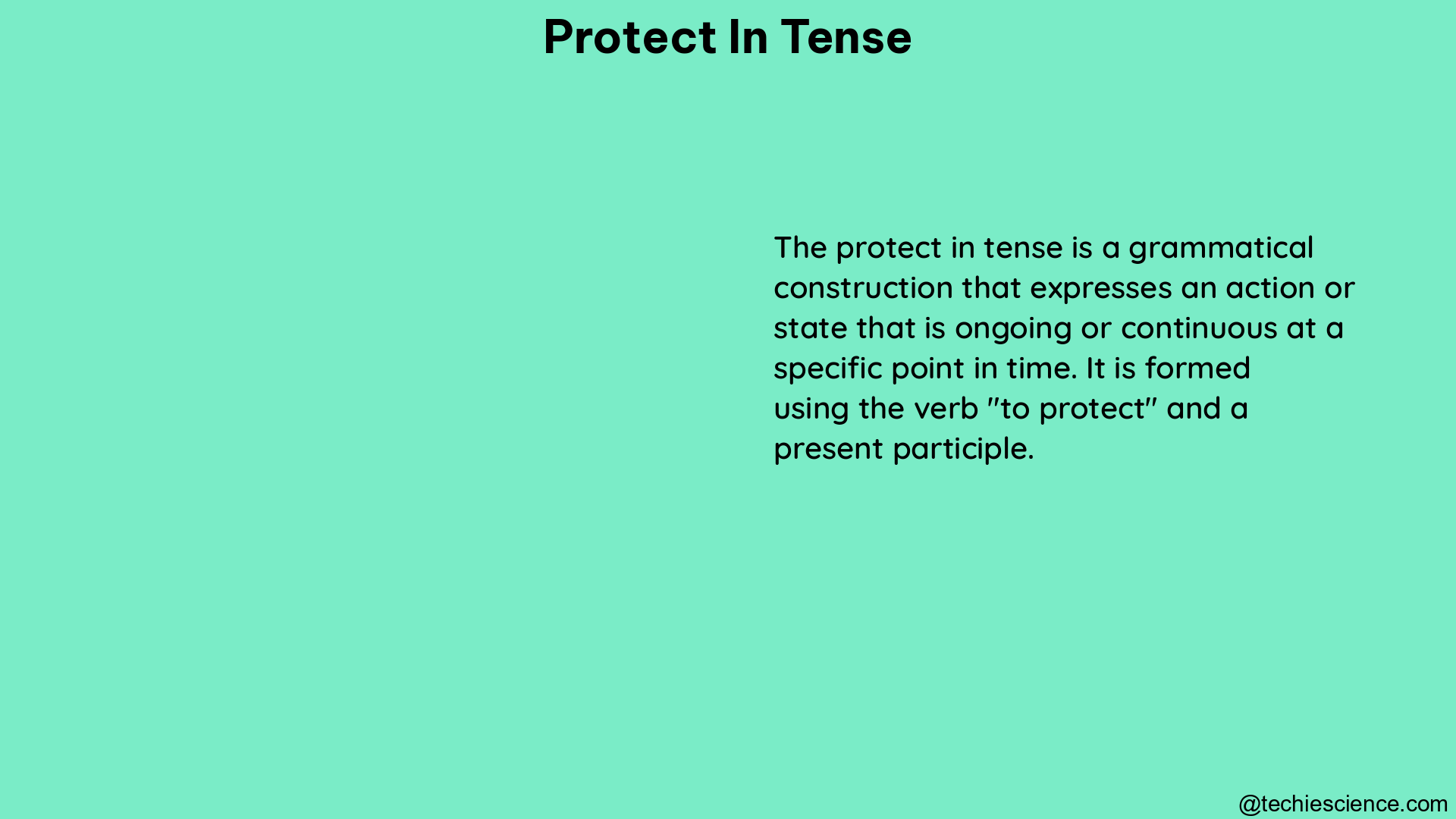The verb “protect” is a versatile and essential part of the English language, with a wide range of tenses and forms that allow for precise and nuanced expression. In this comprehensive guide, we will delve into the intricate details of conjugating “protect” and explore the grammatical specifications that govern its usage.
Indicative Mood
The indicative mood is the most common and straightforward way of expressing facts, statements, and actions. Let’s examine the various tenses and forms of “protect” within the indicative mood.
Present Tense
Present Simple:
– I protect
– You protect
– He/She/It protects
– We protect
– You protect
– They protect
Present Continuous:
– I am protecting
– You are protecting
– He/She/It is protecting
– We are protecting
– You are protecting
– They are protecting
Past Tense
Past Simple:
– I protected
– You protected
– He/She/It protected
– We protected
– You protected
– They protected
Past Continuous:
– I was protecting
– You were protecting
– He/She/It was protecting
– We were protecting
– You were protecting
– They were protecting
Present Perfect Tense
Present Perfect:
– I have protected
– You have protected
– He/She/It has protected
– We have protected
– You have protected
– They have protected
Present Perfect Continuous:
– I have been protecting
– You have been protecting
– He/She/It has been protecting
– We have been protecting
– You have been protecting
– They have been protecting
Past Perfect Tense
Past Perfect:
– I had protected
– You had protected
– He/She/It had protected
– We had protected
– You had protected
– They had protected
Past Perfect Continuous:
– I had been protecting
– You had been protecting
– He/She/It had been protecting
– We had been protecting
– You had been protecting
– They had been protecting
Future Tense
Future Simple:
– I will protect
– You will protect
– He/She/It will protect
– We will protect
– You will protect
– They will protect
Future Continuous:
– I will be protecting
– You will be protecting
– He/She/It will be protecting
– We will be protecting
– You will be protecting
– They will be protecting
Future Perfect:
– I will have protected
– You will have protected
– He/She/It will have protected
– We will have protected
– You will have protected
– They will have protected
Future Perfect Continuous:
– I will have been protecting
– You will have been protecting
– He/She/It will have been protecting
– We will have been protecting
– You will have been protecting
– They will have been protecting
Conditional Mood

The conditional mood is used to express hypothetical or imagined situations. Here are the various forms of “protect” in the conditional mood:
Simple Conditional:
– I would protect
– You would protect
– He/She/It would protect
– We would protect
– You would protect
– They would protect
Conditional Progressive:
– I would be protecting
– You would be protecting
– He/She/It would be protecting
– We would be protecting
– You would be protecting
– They would be protecting
Conditional Perfect:
– I would have protected
– You would have protected
– He/She/It would have protected
– We would have protected
– You would have protected
– They would have protected
Conditional Perfect Progressive:
– I would have been protecting
– You would have been protecting
– He/She/It would have been protecting
– We would have been protecting
– You would have been protecting
– They would have been protecting
Imperative Mood
The imperative mood is used to give commands or make requests. Here are the imperative forms of “protect”:
- Protect
- Let’s protect
Infinitive
The infinitive form of “protect” is:
- To protect
Examples
Here are some examples of “protect” used in various tenses and forms:
- Present Simple: “I protect my family from harm.”
- Present Continuous: “She is protecting the environment by recycling.”
- Past Simple: “They protected the city from the invaders.”
- Past Continuous: “We were protecting the forest from loggers.”
- Present Perfect: “He has protected his business from competitors.”
- Present Perfect Continuous: “They have been protecting the wildlife for years.”
- Past Perfect: “She had protected her data before the system crashed.”
- Past Perfect Continuous: “We had been protecting the community for decades.”
- Future Simple: “They will protect the city from natural disasters.”
- Future Continuous: “He will be protecting the company’s interests.”
- Future Perfect: “We will have protected the environment by 2050.”
- Future Perfect Continuous: “They will have been protecting the forest for a century.”
By understanding the intricate conjugation patterns and grammatical specifications of the verb “protect,” you can effectively communicate your ideas, express hypothetical situations, and give commands with precision and clarity.
References
- Gymglish. (n.d.). Protect – English Verb Conjugation. Retrieved from https://www.gymglish.com/en/conjugation/english/verb/to_protect
- Bab.la. (n.d.). How to conjugate “to protect” in English? Retrieved from https://en.bab.la/conjugation/english/protect
- The Conjugator. (n.d.). English verb conjugation TO PROTECT. Retrieved from https://www.theconjugator.com/english/verb/to%2Bprotect.html
- Collins Dictionary. (n.d.). PROTECT conjugation table. Retrieved from https://www.collinsdictionary.com/us/conjugation/english/protect
- WordReference.com. (n.d.). Conjugation of protect. Retrieved from https://www.wordreference.com/conj/enverbs.aspx?v=protect
Hey! I am Arpita Bose Roy. My qualifications are M.A. in English with B. Ed. in both general education and special education. I have 2 years of experience as a “language analyst” at IIT Kharagpur and 4 years of experience as an “Academic Content Developer” at IIT Kharagpur. Currently, I am working as an academic writer at Lambdageeks.